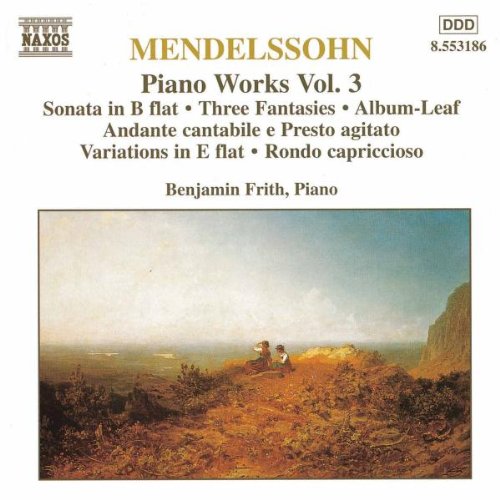Felix Mendelssohn Album: «Piano Works-Vol. 3»

- Customers rating: (4.3 of 5)
- Title:Piano Works-Vol. 3
- Release date:1998-06-09
- Type:Audio CD
- Label:Naxos
- UPC:730099418621
- 1Sonata In B Flat Major, Op. 106: Allegro vivace
- 2Sonata In B Flat Major, Op. 106: Scherzo: Allegro non troppo
- 3Sonata In B Flat Major, Op. 106: Andante quasi Allegretto - Allegro molto
- 4Sonata In B Flat Major, Op. 106: Allegro moderato
- 5Three Fantasies Or Caprices, Op. 16: I. Andante con moto - Allegro vivace
- 6Three Fantasies Or Caprices, Op. 16: II. Scherzo: Presto
- 7Three Fantasies Or Caprices, Op. 16: III. Andante
- 8Album-Leaf In E Minor, Op. 117
- 9Andante cantabile e Presto agitato in B Major
- 10Variations in E Flat Major, Op.82
- 11Rondo cappriccioso In E Major, Op. 14
So far Naxos's previous two volumes have been consistent in quality and I'm happy to announce that the third volume brings some hidden treasures to the spotlight. Mendelssohn's solo piano works tend to be unknown. With the exception of the famous Variations serieuses and the Rondo capriccioso, it's difficult to find anything else of his recorded nowadays; you certainly won't find any of these on a recital disc. Admittedly, these works are light, restrained, and mostly in the Classical mold. But there are some fantastic obscurities here that showcase Mendelssohn's marvelous talents for piano composition.
When someone mentions a piano sonata in B flat major Op. 106, I can only think of one: Beethoven's Hammerklavier. It's unfathomable to think of another sonata with this title. What are the odds of another sonata in B flat major that just happens to be an Op. 106? Since the work was posthumously published, it certainly wasn't deliberate on Mendelssohn's side. Even more peculiar is the first Allegro movement which actually does resemble the first movement of the Hammerklavier; it's almost a petite version of it. This movement is purely inspired by Beethoven and still fresh with delightful Classical ideas. The Andante movement is stunningly beautiful. These four minutes contain one of Mendelssohn's loveliest streams of melodies and modulations. The last movement is just as engaging, with gorgeous arpeggios and frolicking rhythms. In my estimation, this work is a magnificent example of Mendelssohn's competence with the piano forms.
The three Caprices from the Op. 16 are interesting diversions. The first and third have their moments but are predominately restrained, with occasional build ups of passion. The most outstanding of them all is the second, a 3 minute scherzo with a virtuosic and powerful middle section. More remarkable is the Album-Leaf in E minor. This contains a unique and inspired theme. His Romanticism shows a little more here than in the Sonata. I think this Album-Leaf is one of the best gems on this recording, in fact. It possesses abundantly beautiful ideas, all concisely stated, reaching graceful tension and then resolving itself mysteriously. Perhaps an even more original piece is the ravishing Andante cantabile e Presto agitato in B major. Mendelssohn has an affinity for combining these tempo markings together: andante and presto. He is always introducing a radiant stream of alluring melodies and then transforming them into a splash of impassioned ideas. With typical Classicism, Mendelssohn explores an array of emotions, delicate and reserved, but always angelic. It only took me a few listenings to believe that this 8 minute work is worthy of more attention.
The Variations in E flat major is an unusual composition because it consists of only five variations on a single extended theme. It does not measure up to the divine Variations serieuses, but it is still a glorious set of variations resplendent in typical Mendelssohnian fancy and artistry. I find the theme itself rather banal, but Mendelssohn's gifts for improvisation certainly aid him here. He efficiently turns this simple music into an opulent, stylish and tasteful presentation. Perhaps saving the best for last, Naxos and Frith have recorded a decent Rondo capriccioso. I confess that I much prefer Perahia when it comes to Mendelssohn's piano works. While Frith plays this with finesse and excellent technique, the exhilarating drive and Romantic feeling found in Perahia's delivery are unfortunately absent. The Rondo is assuredly the best composition on this disc, but I didn't pay it more than one hearing because of the attention I think these other rarities deserve.
Bottom line: I think the Sonata Op. 106 will delight any who buy this; the Op. 16 Caprices and the Album-Leaf are superlative gems and prove that Mendelssohn's piano works deserve more championship. Beginners to Mendelssohn shouldn't start here, but for those who love to explore obscure piano compositions from major composers, I whole-heartedly recommend this disc.
I am so happy I picked a couple of the Cds in this series by the truly delightful pianist Benjamin Frith at the Georgetown Public Library Book sale the other day. This is one superb pianist, taking these works just at the right level, and making them really glisten. The recorded sound of the piano is just perfect and rich, without being the least bit boomy or clangy. What a treat. It sounds the way great Bosendorfers do when recorded well, but it is probably a Steinway (doesn't say) getting really good reproduction, which often doesn't happen. The Sonata that starts the disc is so ingeniously played. Listen to the slow movement, and think of the millions of possible cloying performances its simple nature could receive. Frith give it a jewel like nature, not trying to hide a sort of costume- jewelry genesis in the Zelter-esque aesthetic . What a delight. I love performers who can sum up a culture, strength and weakness, in the best sense. Frith is a marvel!.
No masterpieces on this third volume of Benjamin Frith's traversal of Mendelssohn's piano music for Naxos, but these charming works are still able to grab the listener's attention, especially in performances as colorfully charming, technically assured and brilliantly phrased as these ones. That said, the Albumblatt op. 117 is not among Mendelssohn's most worthwhile creations, and listening to the Andante cantabile and Presto agitato once is enough; neither is much more than dry note-spinning and of interest to none but the specialist. The early op. 16 works, however, are beguiling, with graceful charm and generally sunny textures, perfectly realized in these performances. The lightly textured, elegant Rondo capriccioso is also excellently dispatched, full of color and life.
Turning to the more substantial works, the B flat Sonata is a fine work (though not as distinguished as its predecessor), but in Frith's hands it becomes utterly appealing. So also for the op. 82 Variations - again, not as interesting as the preceding Variations serieuses, and guilty of containing some rather drab passages, but with Frith as its advocate it becomes a sunnily cheerful, optimistic utterance of genuine charm and appeal. The sound quality is a little flat, but more than merely acceptable, and no one seeking this music - or in general some attractive, less familiar but charming piano music - is well advised to pick up this one, especially at its modest asking price.

